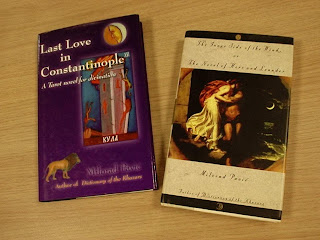Best Books of 2009

Note: this blog entry only concerns books that I read this year, not books published in 2009.
I read many books during 2009, perhaps more than in any other year of my life. There were a few clunkers. I was disappointed with Angela Carter, whom I finally got round to trying, and terminally bored by William Boyd and Françoise Sagan. Another author recommended to me, Shirley Jackson, turned out to be vastly overrated: mundane and lacking true ideas. I also read Jack Kerouac for the first time, but only as a collaborator with William Burroughs (in the novel And the Hippos Were Boiled in Their Tanks) but I found nothing exceptional. Burroughs, however, will always be a firm favourite and I enjoyed his Interzone, a collection of early work.
On the other hand, pleasant surprises included Muriel Spark (much better than I'd expected; The Driver's Seat is a slender masterpiece of darkness) and Daniil Kharms, a Russian absurdist from the 1920s who ended up as one of Stalin's victims (try Incidences, a collection of his stories, plays and letters).
But five books stood out above the others. The finest was probably In the Footsteps of the Abominable Snowman by Josef Nesvadba, a collection of intricately-plotted and conceptually ambitious stories. In no way does Nesvadba resemble Lem or Aldiss, and yet he shares their commitment to cleverness, style and originality. A vastly enjoyable but out of print volume. Some enlightened publisher needs to resurrect Nesvadba; he's a treasure chest waiting to be brought back up into the light.
Nesvadba might have been the best, but he wasn't a new discovery: I was aware of him for many years. Chancing on a brilliant writer for the first time is a special treat. Last year my two big discoveries were Bruce Chatwin and Blaise Cendrars. This year it was the remarkable Irène Némirovsky. David Golder is an utterly compelling novel about high finance in the wake of the Russian Civil War. Written when she was only 26, it tells the moving story of a Jewish businessman who buys and sells Caspian oil fields. The character interactions are sublime and the messages are always ultimately humane. Instead of grinding a single edged political axe, Némirovsky demonstrates an authentic understanding of the complexities of her subject matter.
In sharp contrast, Robert Silverberg's Downward to the Earth is pure fantasy. And yet its twin themes of redemption and transcendence appeal strongly to me. I wish more authors would tackle such large themes. I wish that some Welsh authors would do so. Why don't they? We never get any redemption and transcendence from Welsh writers. We get only pushers and losers instead. But that's a different rant for a different occasion... It was nice to return to Silverberg after more than two decades. I adored his Lord Valentine's Castle when I was in college: indeed I earned to juggle from it. I am mystified why I never sought out his other books until now?
It was even nicer to renew my acquaintance with Donald Barthelme. One of the writers who has had the biggest influence on my own career and aspirations, Barthelme constantly astounds me with his verbal and philosophic invention. He's a writer who doesn't deal with specifics but with sets, and achieves a deeper understanding of the specifics as a result: this statement needs to be explained properly in another post. That's what I'll do one day. Flying to America collects together the 45 published stories missing from his other three collections. Now we finally have Barthelme entire; and the result is good, very good.
Non-fiction... I always suspected that a time would come when I started to read more non-fiction than fiction. That day hasn't arrived yet, but it's getting close. I read many magnificent works of history and science and travel in 2009. A superb biography of Henry Morton Stanley by Tim Jeal made a deep impression; as did a book on the history of the Nizaris by an author whose name I have shamefully forgotten; I also enjoyed a biography of Brian Eno (perhaps my favourite musician) by David Sheppard. The most affecting of all, however, was The Orientalist by Tom Reiss, the biography of Lev Nussimbaum, one of the great lost originals of 20th Century Literature. Nussibaum operated under many aliases, including Essad Bey and Kurban Said: his brief life was adventurous in the extreme and he left behind a significant body of work. His novel Ali and Nino has become the national classic of Azerbaijan; but who talks about him these days? He has lapsed into an incomprehensible obscurity!
I'll wind up now by mentioning that I read dozens of short stories in 2009 by a variety of authors, including a few Borges tales new to me (there can't be many of those left) but 'Mother' by Philip José Farmer remains the most memorable: an utterly perfect piece of work...




